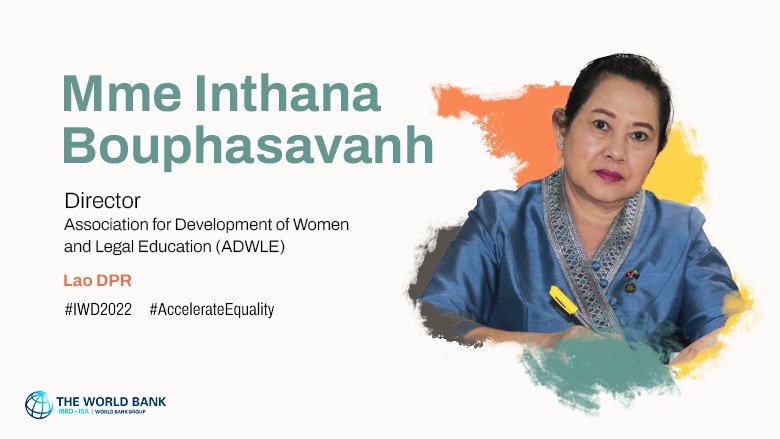I've been in the legal sector since 2001, when I started working at the National University of Laos' Faculty of Law and Political Sciences. We were helping build the capacity of law teachers, and I volunteered to train the lecturers and the students on gender equality and the Convention on the Elimination of All Forms of Discrimination against Women. We organized celebrations of the International Day Against Violence Against Women around the country.
During this work I came to understand that women in Laos lacked knowledge about the law and also had limited access to the justice system. This gave me the inspiration to set up the Association for Development of Women and Legal Education. Formal registration of ADWLE was completed in 2012,so this year sees our tenth anniversary.
As part of our work on livelihoods, we raise awareness on climate change in the villages we work with. It's very relevant to villagers’ livelihoods; affecting their daily lives and routines. We see they need to improve waste management practices and become more environmentally aware. They can start this process themselves by separating their rubbish and taking plastics, waste food, metals, and glass to be recycled. Women and men can – and should – do this work equally and together.
I feel I can transfer knowledge to others, especially to villagers, to help them understand how the actions of women like themselves contribute to climate change. For example, slash-and-burn farming occurs in forested and mountainous areas all around Laos every year. I can explain to farmers about the huge damage that humans cause to the environment and educate them on how they can change their behavior.
I've learned that it's not easy to change a gendered society and to encourage women to exercise their rights. Many Lao people believe that men are the head of the family and can make decisions better than women, or that a husband can hit his wife when she makes a mistake or doesn't listen to him.
This challenge can extend to village administrative levels. For example, we try to persuade village mediation committees to apply formal laws, instead of customary laws that have been used for many centuries. ADWLE wants to guide village authorities on how to integrate gender perspectives into their mediation processes, so that women are properly heard and given access to fair justice.
To get more women into leadership positions in Laos, we should build the capacity of women in different focus areas. For example, through savings groups, water groups, handicraft groups, organic farming, and bamboo production groups.
Furthermore, national five-year Lao Women’s Development Plan should be applied nationwide by all government agencies, NGOs, the private sector, and citizens by upholding women’s rights, gender equality and eliminating violence against women. Women will then be less limited, more confident, and empowered to aspire to leadership positions.
I enjoy being able to help communities; notably women and girls, who suffer gender-based violence, who would otherwise not be able to access support and assistance. I’m pleased to help women exercise their rights and promote them to access the justice system. I am glad that women now know who they can consult and where they can drop by for legal counselling.
Lao women should feel strong and believe they can participate in all levels of society. You can be a good wife and a good mum by generating income for family growth with your own hands. This is not so difficult. You can stand up for yourself for a fair division of labor in your household. You can explain about gender equality to your husband and your children to break down gender stereotypes. You can explain about respecting women's rights in order to live in peace and harmony.
To improve gender equality we can start changing our behavior first. Then we can teach or train others. We can build role models as agents for change in our working environments and public community.
Firstly I plan to build AWDLE to be a role model among Lao organizations for applying the law to exchange knowledge, experience and best practices from our work in legal education. Secondly, we will build more gender experts.
Leadership involves taking the initiative and generating ideas that help people toward reaching their goals and turning their hopes into reality. A leader doesn’t always have to be in a senior position. Any person can demonstrate good leadership.
Women leaders understand the needs of women. We need female leaders so that women are visible in high profile roles and demonstrate that they can do as men do. A woman can be a president, prime minister, minister, judge, pilot, police officer, soldier, or a director.
The biggest challenge I face is ensuring jobs for my staff. As head of a non-profit association, I constantly have to seek funding to keep the association going and growing. It's difficult to find grants that can provide long-term security.
**The views expressed in this interview do not necessarily represent the views of the World Bank Group.



